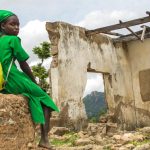In northern Nigeria, 60% of women and girls do not have access to the internet and lack digital skills. Some factors responsible for this include poverty, illiteracy, and access to digital education.
Also, across the region, women are marginalised in the digital space; 55% of men in northern Nigeria do not want their wives to use the internet, and 61% of fathers discourage their daughters from using it, this is according to a study by the Centre for Information Technology and Development or CITAD.
Closing the Gap
To address the issues of digital inclusion in the region, a digital literacy and skills development program, ‘the Gina Mata, Gina Al’umma’, translated in Hausa as “Build up women, Build the community,” was instituted to train women and girls and help them take their first step into the digital world.
The project, a pilot program launched by the World Bank and supported by the National Information Technology Development Agency or NITDA, and implemented by Natview Technology, to connect young women in rural and conflict-affected communities with digital skills that will help them participate fully in the global ecosystem of work.
The project was implemented in four cities across northern Nigeria, including Kano, Dutse, Gombe, and Maiduguri.
For communities affected by conflicts, like Maiduguri, the project couldn’t have come at a better time, as it afforded young women affected by the Boko Haram insurgency the opportunity to learn new digital skills, with the hope that connecting them to the digital ecosystem, would help play a significant role in uplifting their livelihoods and that of their communities.
“The girls and young women in those communities face great challenges to access basic human rights principles and conditions to live a normal life,” expressed Abraham Waino, a staff at Natview Technology.
The instructors at the 10-day training deployed both Hausa, Kanuri and English as instructional language, hoping to break the language barrier participants might face.
Before the training commenced, the Borno State Ministry of Education sent letters to various secondary schools in Maiduguri to send names of their students who they want to be participants. So the secondary schools made the selection and sent details of the students to the ministry, including those displaced by conflicts. A few days before the training kick-off, the girls were notified.
Start with a click, then share
For Fateemah Abba Isah, a student of Abba Ganaram Secondary School, Maiduguri, Borno State, the training has developed her interest in graphic design, and she is grateful for the opportunity as she now uses the skill to make wedding placards and logos for small business around her.
“The training was impactful to me as I learned something I can now use to earn money. I’m also looking forward to teaching my friends in our community and even colleagues in school,” Isah said.
Participants were taught gig economy, provided with an understanding of Science, Technology, Engineering and Maths or STEM, content creation, graphics design, and visual storytelling. Participants were also taught customer relationship skills, which they can deploy when selling online.
Other than displaced girls and secondary school students, a sub-project was designed and implemented to train secondary school teachers on how they can leverage modern teaching methods in their curriculum.
Hadiza Wurojam, a teacher at Women’s Day Secondary School Maiduguri, says she is now passing down the knowledge to her students.
“We started making efforts to teach the children how to utilise productive tools like MS Word, Google Drive, and Canva too for designs,” she noted.
There is more
Fateemah Mafi, one of the trainers, said there is much more that can be done using the internet, and the women and girls need to get comfortable with the computers, and things can expand from there.
“By embracing the digital devices available in the classroom and also utilising innovative ways, I was able to create an immersive learning experience for the secondary school teachers,” Fateemah Mafi, who trained the teachers, told Prime Progress.
She added that the digital world is a place of self-discovery, and the women and girls who participated in the training will learn more on their own.
According to Waino, the best way to achieve notable development in education in the 21st century is to implement STEM and digital skills programs in schools. “They can be great contributors in improving the lives and livelihood of underserved communities,” he said.
The program reached 155 persons, including 30 teachers from various secondary schools in Maiduguri, 25 girls from conflict-affected communities and 100 secondary school students.
But even as the instructors expressed excitement about the training, they fear that some students will forget some of the things they have learned if they are not constantly supported.
Removing gender and cultural barriers
Muhammad Bello Buhari, a digital rights activist and administrative lead at the Digital Grassroots Organization, insist that programs like this can be used to address cultural and societal norms that promote gender disparities and can be conversation starters towards implementing laws that protect women’s digital rights and safety online.
Buhari also held that collaboration and partnerships among various stakeholders, including governments, civil society organisations, the private sector, and international bodies, can go a long way in filling the gap of the digital gender divide in the region.
“There is still a chance to create a more inclusive digital environment that empowers women and girls, promotes gender equality, and unlocks their full potential in the digital economy,” he said.
In northern Nigeria, 60% of women and girls lack internet access and digital skills due to poverty, illiteracy, and limited digital education. Social norms also marginalize women in the digital space, with many men discouraging their wives and daughters from using the internet according to a CITAD study.
To address these issues, the World Bank and NITDA launched the 'Gina Mata, Gina Al'umma' program, meaning "Build up women, Build the community." This initiative trains women and girls in digital literacy and skills, implemented in four northern Nigerian cities: Kano, Dutse, Gombe, and Maiduguri.
The initiative is particularly valuable in conflict-affected areas like Maiduguri, providing young women displaced by Boko Haram with digital skills to improve their livelihoods. Participants received training in various areas including STEM, content creation, graphics design, visual storytelling, gig economy, and customer relationship skills.
Instructors used local languages to ensure effective learning, and the Ministry of Education facilitated participant selection. The training has had significant impacts, with participants like Fateemah Abba Isah leveraging new skills for income and planning to teach others.
A sub-project also trained secondary school teachers on modern teaching methods. Trainer Fateemah Mafi emphasized the digital world's potential for self-discovery and the necessity of ongoing support to retain skills learned.
Digital rights activist Muhammad Bello Buhari advocated for such programs to challenge cultural norms and promote gender equality, urging collaboration among various sectors to close the digital gender divide.






